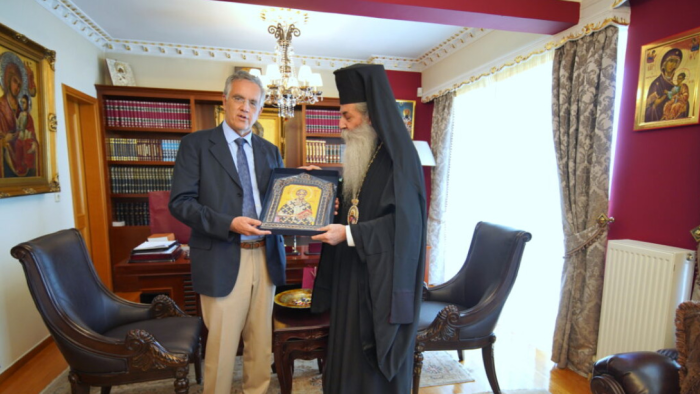
On September 7, human rights defender and longstanding member of the Legal Experts Advisory Panel (LEAP), Panayote Dimitras will return to court in Athens to face charges of false accusation and aggravated defamation against Kostas Katsikis, a former MP of the Independent Greeks party. Next month, Dimitras has two further trials, accused of the same charges by musician and actor, Yannis Zouganelis, and Mayor of Limni-Mantoudi-Agia Anna, Christos Kalyviotis. The hearings are the latest in a decade-long judicial harassment campaign against the civil society organisation Greek Helsinki Monitor, for whom Dimitras is a spokesperson.
For a number of years, the Greek Helsinki Monitor has publicly denounced behaviour, by high-ranking officials and other state figures, that it deems racist or homophobic. In April 2017, Dimitras and his colleague Andrea Gilbert lodged a complaint of antisemitic hate speech against the Metropolitan Bishop of Piraeus Seraphim. While the Bishop was neither charged nor investigated, Dimitras and Gilbert were subsequently accused of making a false accusation. On February 15 2022, the two human rights defenders received a one year suspended prison sentence.
Dimitras now faces a further three court hearings with similar circumstances. In each case, charges were brought after the Greek Helsinki Monitor filed complaints to challenge racist or homophobic speech by politicians and other public figures. The prosecution of Dimitras and his colleague is evidence of how the criminal law is being used to silence and harass civil society in Greece rather than to combat hate speech. Supposedly progressive laws, created to tackle hatred, are not implemented while the authorities are bringing prosecutions against those reporting hate crimes, a tactic designed to silence civil society and close down political dissent.
These cases illustrate the risks of giving repressive and punitive powers to authorities without engaging in structural reform to eradicate hatred in society. The public appearance of Greece’s newly appointed Prosecutor of the Supreme Court, Isidoros Dogiakos with the Metropolitan Bishop of Piraeus Seraphim at the end of July (pictured above) also casts doubt about the independence of the prosecutorial authorities in Greece. The Government’s recent appointment of Supreme Court Judge Marianthi Pagouteli as the Vice President of Greece’s Supreme Court (Areios Pagos) was denounced by the opposition, media and NGOs, including the Central Board of Jewish Communities in Greece. In a highly publicised trial, Pagouteli justified the antisemitic views of a then-convicted Holocaust denier, asking for his acquittal with her 32-page dissenting legal opinion. As the European Commission’s 2022 Rule of Law report on Greece noted, “the appointments procedures for the highest senior positions of judges and prosecutors continue to raise concerns”.
As well as chilling freedom of speech, such use of criminal law and powers is undermining the rule of law and weakening democracy in a country that has endured a number of economic, political and social crises since 2009. Additionally, it is further disturbing evidence of the global misapplication and overuse of the criminal law for purposes that have nothing to do with fighting crime or safeguarding communities.
The need to address structural racism in Greece, which the Greek Helsinki Monitor seeks to challenge, is especially necessary in view of the policy of criminalising refugees pursued by Greek authorities in recent years. There have been multiple prosecutions involving refugees, including murder charges being brought against a grieving father whose son died during a ferry crossing, and the ongoing case of a woman facing arson charges after she attempted suicide by setting herself on fire.
A recent report by the Greek Council for Refugees, Oxfam and Save the Children noted: “Criminalization of refugees and those who support them continues as part of a broader policy of deterrence. Recent acquittals by the courts of Samos, Chios and Kalamata demonstrate the unlawful criminalization and the unjustified consequences of the concomitant pre-trial detention and restrictive measures on refugees’ personal and family life, as well as their access to asylum.”
Earlier this year, the EU’s Civil Liberties Committee looked into reports of ‘pushbacks’ and informal returns at Greece’s external land and sea borders, which appear to contravene rulings by the European Court of Human Rights.
Commenting on the case, Ioana Bărbulescu, Networks Coordinator for Europe, said:
“Fair Trials is calling for an end to the judicial harassment of the Greek Helsinki Monitor and other civil society organisations in Greece. Criminal law should not be used as a tool of oppression to attempt to silence dissent and political opposition.
“We also call on the Greek authorities to stop criminalising those who are seeking asylum and urge the European Union to continue to challenge Greece on its use of criminal powers against refugees and civil society. But the EU should also stop pursuing its own criminalisation agenda through hate speech legislation, which will give authorities across Europe arbitrary and repressive powers. As Dimitras’s cases show, the expansion of criminal powers will inevitably be used by authorities to embed structural racism rather than oppose it. We need to engage in broader, more meaningful and structural reforms to eradicate hatred and to support civil society other organisations and individuals committed to change.”
“Greece is not alone in its recourse to criminal prosecution as a solution for social and other issues. The EU needs to show leadership in challenging the ever increasing recourse to criminalisation, including by rejecting recent EU policies to tackle hate speech through punitive powers.”


